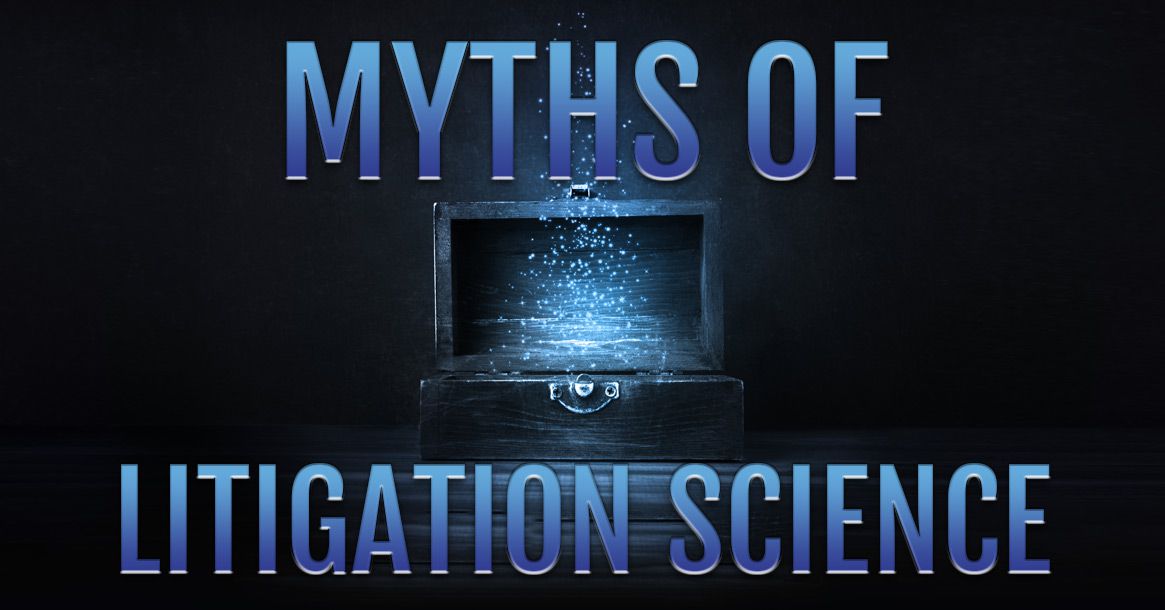At Courtroom Sciences, Inc., we have written blog posts about understanding the litigation consulting industry and what to look for when selecting a jury consultant. Continuing our focus on informing legal departments and teams about the litigation psychology field, we have created a series of posts that identify and debunk many of the common “Myths of Litigation Science.”
Myth #1: “We don’t need a mock trial; we don’t go to trial often.”
“We don’t go to trial that often, so we don’t need to do a mock trial” is something we commonly hear from potential clients. With the trial rate in the United States at less than 3%, there are very few corporations who are going to trial. However, this statistic should not deter organizations from investing in mock trials. When conducted using the scientific method by trained litigation research experts, mock trials provide much more than just ‘trial practice.’ In fact, we have coined the term “settlement science” as a more appropriate way to explain the value of our research services. Since most cases will settle, it is imperative that clients have real data upon which to make settlement decisions. When litigation psychologists are involved prior to the discovery phase, clients have a better idea of the pieces of evidence that jurors find compelling. They can then present this evidence to mock jurors and gauge its effectiveness. In addition, counsel may learn that they should attempt to elicit a piece of information from a witness that they never would have considered.
Although the primary reason for doing a mock trial may not be to prepare for a real trial, the results can be used in a few different ways. First, they can be utilized in settlement negotiations. For example, we once had a mock trial in which the client settled the case during jury deliberations because he was able to identify the potential exposure his client would have had if the case would have gone to trial. In another example, John Duffey of Stuart & Branigin LLP indicated that, “[The litigation consultant] did a great job developing/exposing issues, attitudes, and themes via a focus group…we then used excerpts at a mediation; this proved very effective—the case was resolved on reasonable terms.”
Mock trial results can also provide clients with a clearer picture of what the case is worth. We have found that many case valuations are calculated using gut instinct, experience with “these types of cases,” and jury verdicts and settlements obtained from online databases, such as LexisNexis and Westlaw. However, these methods (individually or combined) are inferior to a science-based method that removes “gut instinct” from the equation and replaces it with empirical data. Mock trials can improve the likelihood that clients settle cases for what they are actually worth, versus what the historical data suggests they are worth, especially when calculating value based on each specific case. Thirty years of data has proven that the price of a mock trial significantly outweighs the cost of settling a case for an unreasonable amount.
If the case does make it to trial, the mock trial results can be used to inform trial strategy. As indicated by one attorney after one of his recent trials, “Drawing upon the fantastic work of the mock, we were able to identify and plan around various issues that required attention and re-prioritizing our trial themes…Candidly another fantastic piece of the mock trial experience is that it forced us to learn our case early and so by the time we began trial preparation in late August, we were way out in front of the power curve. So, the mock and the work you all did was critical.” It should be noted that this case was taken all the way to a jury verdict and the amount awarded to the plaintiff was “settled for a number plaintiffs would never have negotiated with us on at any point during the course of the case.”
In conclusion, the involvement of litigation psychologists should not be predicated on whether the client is going to trial. It is more about the client entering into settlement negotiations with a clear picture of how much that specific case is worth and whether it makes sense to proceed to trial. The reputation of the company and the safety of key stakeholders’ jobs could be relying on whether the decision was fully informed by empirical data or “gut instinct.”

Be confident in achieving superior litigation outcomes. CSI has the expertise, track record, and capabilities to help you win.



